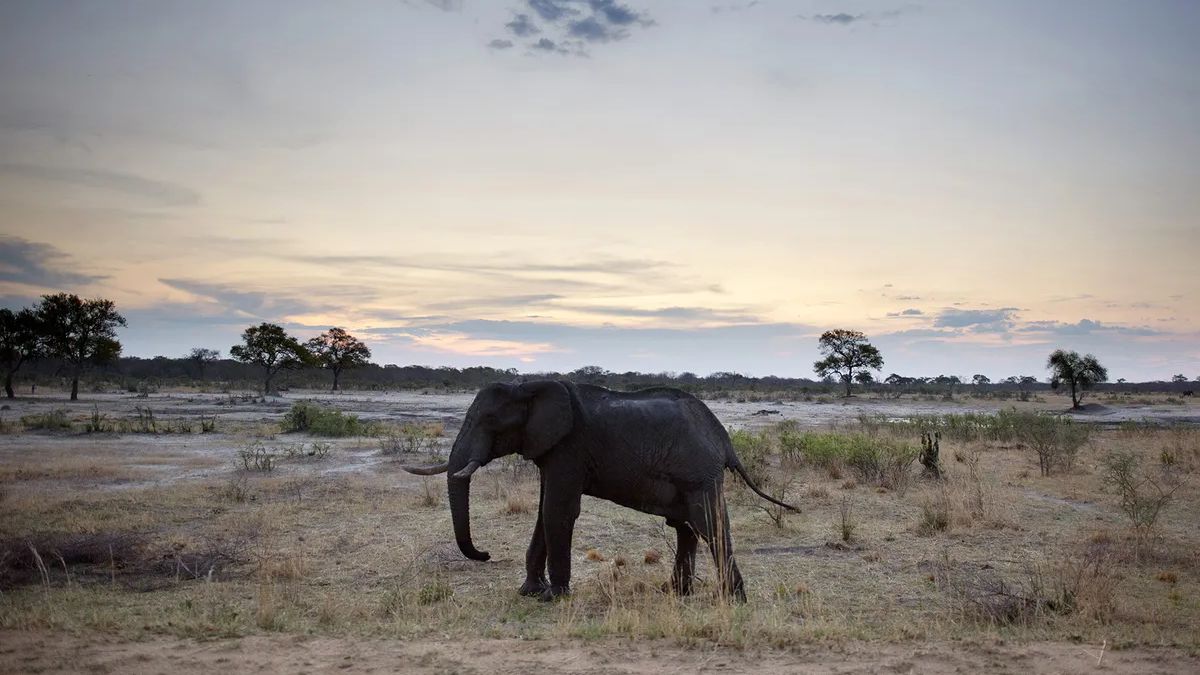Zimbabwe is battling its worst drought in decades.
With nearly half of its population facing the risk of acute hunger the landlocked African country has authorised a mass slaughter of over 200 elephants to feed its hungry citizens.
“Culling elephants is a tough but humane choice,” Secretary for Information and Publicity Nick Mangwana wrote in a post on X. “It protects from prolonged suffering from thirst, starvation. It maintains ecosystem balance and ensures remaining wildlife thrives.”
Zimbabwe has “more elephants than it needs”, the environment minister Sithembiso Nyoni said in parliament on Wednesday as the country shall soon proceed with its first elephant cull in 40 years.
Here’s a closer look at the situation
200 elephants are ‘just drop in the ocean’
Zimbabwe, home to around 100,000 elephants—the second-largest population after Botswana—is facing an elephant overpopulation crisis.
Due to conservation efforts, Hwange, the country’s largest reserve, hosts over 65,000 animals, more than four times its capacity, according to Zimbabwe Parks and Wildlife Authority (ZimParks).
Reiterating the same, Environment Minister Sithembiso Nyoni told the parliamentarians last week that “Zimbabwe has more elephants than we need and more elephants than our forests can accommodate.”
She added that the overpopulation of elephants in the country “causes a lack of resources” for their sustenance, which is fuelling human-wildlife conflict.
“When there is an overpopulation of wildlife in a specific park, they will then seek to go outside the park to look for other resources such as water or greenery. When that happens, they will then come into contact with the humans and conflicts begin," Nyoni further stated.
Just last year, Zimbabwe lost 50 people to elephant attacks.
Tinashe Farawo, a spokesperson for the Zimbabwe Parks and Wildlife Authority told Reuters that the culling is part of the country’s efforts to decongest its parks.
“It’s an effort to decongest the parks in the face of drought. The numbers are just a drop in the ocean because we are talking of 200 (elephants) and we are sitting on plus 84,000, which is big,” he said.
The director general of ZimParks, Fulton Mangwanya said the 200 elephants would be hunted in areas where they had clashed with humans, including Hwange.
Zimbabwe is battling its worst drought
Zimbabwe has been battling its most severe drought in four decades, with an estimated 68 million impacted across the region.
Like its neighbour Namibia , Zimbabwe is among a swathe of countries in southern Africa that have declared a state of emergency because of drought, a crisis exacerbated by El Niño — a natural climate pattern that has resulted in very little rainfall in the region since the beginning of the year.
It means there is little to eat in many areas as crops wither away and harvests dwindle.
Environment Minister Sithembiso Nyoni told Voice of America that the country is mulling taking similar measures to Namibia, which culled 83 elephants, 30 hippos, 60 buffalo, as well as 50 impalas, 100 blue wildebeest, 300 zebra, and 100 elands last month to feed its hungry citizens.
“We are having a discussion with ZimParks and some communities to do like what Namibia has done, so that we can cull the elephants and mobilise the women to maybe dry the meat, package it, and ensure that it gets to some communities that need the protein,” she said.
‘Future generations have right to see elephants’
The proposed elephant culls in Zimbabwe have sparked significant criticism.
Farai Maguwu, head of the Center for Natural Resource Governance, expressed strong opposition on X, saying, “Culling of elephants must be stopped. Elephants have a right to exist… future generations have a right to see elephants in their natural habitat.”
According to the World Wildlife Fund, Africa’s elephant population has dwindled to about 415,000 from millions in the early 20th century, making this cull a contentious issue.
Experts and animal rights activists also warn that the cull could damage Zimbabwe’s image and deter tourists. Maguwu stressed, “The government must have more sustainable eco-friendly methods for dealing with drought without affecting tourism,” adding that alive, elephants are “more profitable” than dead.
“We have shown that we are poor custodians of natural resources and our appetite for ill-gotten wealth knows no bounds, so this must be stopped because it is unethical,” he was quoted as saying in The Guardian.
Magawu argues that “Zimbabwe has always been pushing for the right to kill elephants” as the real intention is economic.
“We all know when you look at how our natural resources are being plundered right now, like minerals, the whole idea is to sell ivory. It’s not even about the communities there,” told Voice of America.
In response, Environment Minister Nyoni defended the cull, saying it is legally justified.
“If Zimbabwe had a way, we would sell our elephants for ivory yesterday,” said Nyoni.
“The people who prevent us from selling our ivory are people who have already finished and killed off their own animals. They don’t have elephants. And they don’t have the experience of this human-wildlife conflict that we are facing,” Nyoni added.
With input from agencies


)

)
)
)
)
)
)
)
)



